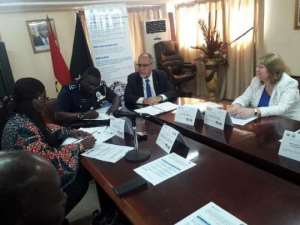
Mr Pierre Lapaque, the West/Central African Representative of the United Nations Office on Drugs and Crime (UNODC), said West Africa remained a region vulnerable to, and affected by, acute threats in terms of transnational organised crime.
This, he said, includes the use of the Region as a transit area for cocaine and heroin, cannabis cultivation and trafficking and development of local laboratories for amphetamine-type stimulants and their precursors.
Mr Lapaque made the remarks at a ceremony to sign an agreement on the basic principles and main objectives governing the implementation of the Technical Assistance to Ghanaian Authorities to Counter Drug Trafficking and Organised Crime by the Ghana Police Service and the UNODC in Accra.
The project is being implemented by the UNODC, in collaboration with the Government of Ghana, and funded by the US Department of State's Bureau of International Narcotic and Law Enforcement Affairs.
It is aimed at supporting Ghana's efforts on counter narcotics through the provision of technical assistance to the Drug Law Enforcers Unit (DLEU) of the Criminal Investigation Department of the Police Service and sister law enforcement agencies to effectively address the challenges posed by drug trafficking in Ghana.
The project is also for basic and advanced drug investigation training and monitoring for law enforcement officials in counter narcotics and organised crime to improve the coverage of DLEU.
This would be done through the establishment of four new regional units to provide logistics support to equip the units to function effectively, enhance inter-agency cooperation and improve drug testing capacities to support prosecution among other things.
Mr Lapaque said the West African Region was suffering from intra and inter-regional trafficking of persons and smuggling of migrants, firearms and fraudulent medicines and that Ghana and the Region were not spared these criminal activities, which represent threats to security.
Mr David Asante Apeatu, the Inspector General of Police, said illicit drug trafficking was not solely a Ghanaian problem but a problem in the United States, which had grown increasingly worse in the past few years.
He said the Ghana Police Service had made some progress in fighting trafficking over the years, but one of the unfortunate results was that the traffickers had changed their modus operandi.
Mr Apeatu said drug dealers joined forces and formed syndicates and those were now large global operations, with millions of dollars in legitimate assets in addition to their criminal enterprises being used to cover the illicit activities.
DCOP/Mrs Maame Tiwaa Addo-Danquah, the Director-General of CID, said it was imperative for the Police to be more organised and better equipped to adequately deal with drug trafficking and other organised crimes, especially terrorism.
She said the Police Administration was ambitiously transforming itself into a world class police service capable of delivering planned democratic, protective and peaceful services to international standards.
DCOP Addo-Danquah said it was in line with this that the CID had fully embraced the CRIMJUST Programme, which had a concerted approach to contribute to fighting organised crime in general, and drug trafficking in particular, along the cocaine routes in Latin America, the Caribbean and West Africa.
Mrs Christine Evans-Klock, the United Nations Resident Coordinator, said experience across the globe motivated heads of states to embed peace, justice and human rights as the bedrock of the global community's commitment in the 2030 Agenda for Sustainable Development.
She said to achieve national ambitions within this unified agenda for social, economic and environmental development, countries must first build peace as a culture through the rule of law and institutions for conflict resolution, governance and accountability.
Other dignitaries present at the ceremony were senior officers of the Police Service and officials from the American, Italian and French embassies.




 Saglemi Housing Project will not be left to rot – Kojo Oppong Nkrumah
Saglemi Housing Project will not be left to rot – Kojo Oppong Nkrumah
 Transport fares hike: GPRTU issue two-day ultimatum
Transport fares hike: GPRTU issue two-day ultimatum
 ARC endorses Alan as presidential candidate – Buaben Asamoa
ARC endorses Alan as presidential candidate – Buaben Asamoa
 Akufo-Addo appoints Kwasi Agyei as new Controller and Accountant-General
Akufo-Addo appoints Kwasi Agyei as new Controller and Accountant-General
 PNC dismiss reports of mass resignations
PNC dismiss reports of mass resignations
 PAC advocates for revenue collectors to be engaged on commission basis, not full...
PAC advocates for revenue collectors to be engaged on commission basis, not full...
 Genser Energy commissions 110km of natural gas pipeline at Anwomaso
Genser Energy commissions 110km of natural gas pipeline at Anwomaso
 Naa Torshie calls for tolerance, peace ahead of 2024 election
Naa Torshie calls for tolerance, peace ahead of 2024 election
 Asantehene commends Matthew Opoku Prempeh for conceiving GENSER Kumasi Pipeline ...
Asantehene commends Matthew Opoku Prempeh for conceiving GENSER Kumasi Pipeline ...
 Let’s do away with ‘slash and burn politics’ in Ghana — Dr Adutwum
Let’s do away with ‘slash and burn politics’ in Ghana — Dr Adutwum
